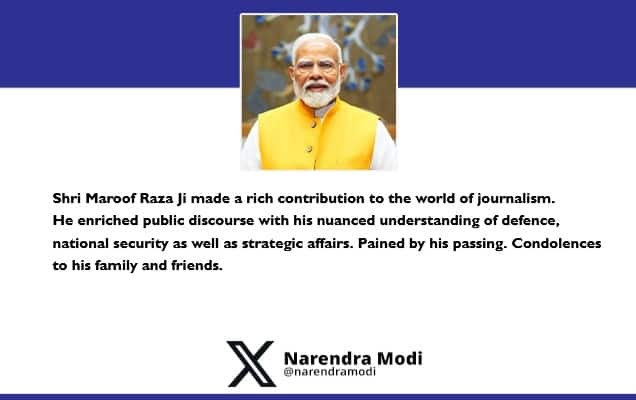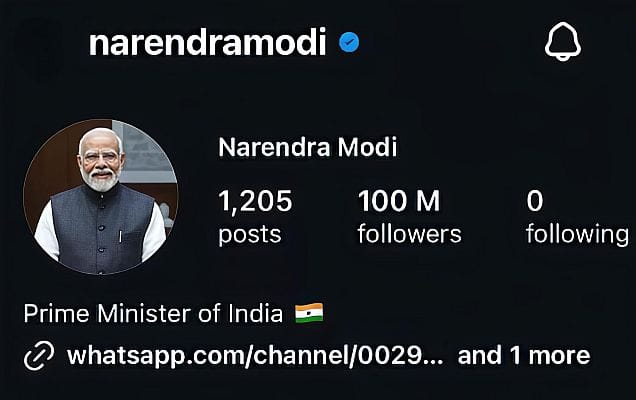The Prime Minister, Shri Narendra Modi laid the foundation stones and dedicated to the nation, various healthcare facilities around Rs. 1275 crore in Civil Hospital Asarwa, Ahmedabad.
After arriving at the venue, the Prime Minister took a walkthrough of the Health Infrastructure Projects. This was followed by the Prime Minister’s arrival on the dais where he was felicitated. The Prime Minister unveiled the plaque and dedicated to the nation: (i) Institute of Kidney Diseases Research Centre (IKDRC) in Manjushree Mill Campus (ii) Hospital Building 1C of Gujarat Cancer Research Institute at Civil Hospital Campus, Asarva (iii) Hostel at UN Mehta Hospital (iv) Expansion of Gujarat Dialysis Programme with One State One Dialysis (v) Chemo Programme for Gujarat State. This was followed by the Prime Minister laying the foundation stone of (i) New Medical College, Godhra (ii) New Super Speciality Hospital of GMERS Medical College, Sola (iii) Medical Girls College at Civil Hospital, Asarwa (iv) Ren basera Civil Hospital, Asarwa (v) 125 bed District Hospital, Bhiloda (vi) 100-bed sub-district hospital, Anjar.
The Prime Minister, Shri Narendra Modi laid the foundation stones and dedicated to the nation, various healthcare facilities around Rs. 1275 crore in Civil Hospital Asarwa, Ahmedabad.
After arriving at the venue, the Prime Minister took a walkthrough of the Health Infrastructure Projects. This was followed by the Prime Minister’s arrival on the dais where he was felicitated. The Prime Minister unveiled the plaque and dedicated to the nation: (i) Institute of Kidney Diseases Research Centre (IKDRC) in Manjushree Mill Campus (ii) Hospital Building 1C of Gujarat Cancer Research Institute at Civil Hospital Campus, Asarva (iii) Hostel at UN Mehta Hospital (iv) Expansion of Gujarat Dialysis Programme with One State One Dialysis (v) Chemo Programme for Gujarat State. This was followed by the Prime Minister laying the foundation stone of (i) New Super Speciality Hospital of GMERS Medical College, Sola (ii) Medical Girls College at Civil Hospital, Asarwa (iii) Ren basera Civil Hospital, Asarwa (iv) 125 bed District Hospital, Bhiloda (v) 100-bed sub-district hospital, Anjar.
The Prime Minister interacted with patients in CHCs in Morva Hadaf, GMLRS Junagadh and CHC Waghai.
Addressing the gathering, the Prime Minister said that it is a huge day for health in Gujarat and congratulated everyone associated with these projects for completing them on time. Shri Modi remarked that the most advanced medical technology of the world, improved benefits and medical infrastructure will be made available to the public of Gujarat thereby benefiting the society. With the availability of these medical benefits, the Prime Minister informed that those who cannot afford private hospitals can now head to these government-run hospitals where medical teams will be deployed to serve with urgency. The Prime Minister recalled that approximately three and a half years ago, he got the opportunity to inaugurate a maternal and child health super speciality hospital with a 1200 bed facility.
The Prime Minister noted that the capacity and services of the Institute of Kidney Diseases and U N Mehta Institute of Cardiology are also being expanded. Facilities like upgraded bone marrow transplants are also starting with the new building of Gujarat Cancer Research Institute. “This will be the first government hospital in the country where state-of-the-art technology like Cyber-Knife will be available”, he said. The Prime Minister said that Gujarat is rapidly scaling new heights of development. He pointed out, then the pace of development is like that of Gujarat, the work and achievements are so much that it becomes difficult to even count them at times.
Dwelling upon the ills of the system in Gujarat 20-25 years ago the Prime Minister listed the diseases of backwardness of the health sector, mismanaged education, scarcity of electricity, misadministration and law and order issues. At the top of this was the biggest ill, that is, vote bank politics. He said today Gujarat is moving ahead, leaving behind all those diseases. Today, when it comes to hi-tech hospitals, Gujarat stands at the top. When it comes to educational institutions, Gujarat has no match today. Gujarat is moving ahead and scaling new trajectories of growth, he added. Similarly, water, electricity and law and order situation in Gujarat has improved tremendously. Shri Modi said, “Today Sabka Saath, Sabka Vikas, Sabka Vishwas and Sabka Prayas Government is working tirelessly for Gujarat.”

The Prime Minister said that Health Infrastructure Projects that were unveiled today have given a new identity to Gujarat and these projects are the symbols of the capabilities of the people of Gujarat. He also noted that along with good health facilities, the people of Gujarat will also feel a sense of pride that the world's top medical facilities are now witnessing continuous growth in our own state. This will also contribute to the medical tourism potential of Gujarat.
The Prime Minister stressed that intention and policies both need to align for good health infrastructure. “If the heart and intention of the government are not filled with concern for the people’s problems, then the creation of suitable health infrastructure is not possible”, he said. The Prime Minister pointed out that when efforts are made wholeheartedly with a holistic approach, their results are equally multifaceted. “This is the success mantra of Gujarat”, he said.
Taking the analogy of medical science further, the Prime Minister said that he, as Chief Minister, applied ‘surgery’ i.e. weeding out old irrelevant systems with intention and force. Second ‘medicine’ i.e. ever-new innovation for strengthening the system, third ‘Care’ i.e.working with sensitivity for the development of the health system. He informed Gujarat was the first state who took care of animals also. He said given the nature of diseases and pandemics, One Earth One Health Mission needs to be strengthened. The Prime Minister pointed out that the government acted with care. “We went among the people, shared their plight”, he added. Reflecting on the efforts that were made by connecting people together through public participation, the Prime Minister said that when the system became healthy, the health sector of Gujarat also became healthy and Gujarat was being used as an example in the country.
The Prime Minister reiterated that he applied the learnings from Gujarat to the Central Government. He informed that in the last 8 years, the Central Government has presented 22 new AIIMS in different parts of the country and Gujarat has also benefited from this. “Gujarat got its first AIIMS in Rajkot”, Shri Modi added. Reflecting on the work done in the health sector in Gujarat, the Prime Minister pointed out the day will not be far when Gujarat will excel in medical research, biotech research, and pharma research and make a name for itself on the global level.

The Prime Minister noted that when the government is sensitive, then it is the society that reaps the biggest benefit including the weaker sections, as well as mothers and sisters. Recalling the time when infant mortality rate and maternal mortality rate were of grave concern to the state and the previous governments had blamed destiny for such unfortunate incidents, the Prime Minister interjected that it was our government that took a stand for our mothers and children. “In the last twenty years”, Shri Modi added, “we drafted the required policies and put them into application that resulted in a drastic decline of the mortality rates.” Throwing light on ‘Beti Bachao Beti Padhao Abhiyan’, the Prime Minister remarked that the number of girls being born has now surpassed the number of newborn boys. The Prime Minister attributed such successes to the policies of the Gujarat government such as ‘Chiranjeevi’ and ‘Khilkhilaahat’. Shri Modi further added that Gujarat’s success and efforts are showing the way to central government missions like ‘Indradhanush’ and 'Matru Vandana’.
Concluding the address, the Prime Minister pointed out schemes like Ayushman Bharat for the treatment of the poor and needy. Elaborating on the strength of the double-engine government, the Prime Minister said that the combination of Ayushman Bharat and Mukya Mantri AmritamYojna is serving the health needs of the poor in the state of Gujarat. “Health and Education are the only two sectors that decide the direction of the future, not just the present.” Giving the example of a civil hospital with 1200 bed facility in 2019, the Prime Minister said that the same hospital emerged as the largest health centre and served the people during the Covid-19 pandemic that hit the world a year later. “That single health infrastructure saved the lives of thousands of patients during the pandemic”, he added. The Prime Minister concluded by stressing the need to improve the present conditions as well as work for the future. “I wish that you and your families stay free from any diseases”, Shri Modi said.

Chief Minister of Gujarat, Shri Bhupendra Patel, Members of Parliament, Shri C R Patil, Shri Narhari Amin, Shri Kiritbhai Solanki and Shri Hasmukhbhai Patel were those present on occasion among others.
Background
The Prime Minister, Shri Narendra Modi laid the foundation stones and dedicated to the nation, various healthcare facilities around Rs. 1275 crore in Civil Hospital Asarwa, Ahmedabad. The Prime Minister laid the foundation stone of shelter homes to accommodate families of poor patients. The Prime Minister dedicated new and improved facilities for cardiac care and a new hostel building at U.N Mehta Institute of Cardiology and Research Centre, a new hospital building of the Institute of Kidney Diseases and Research Centre, and a new building of Gujarat Cancer and Research Institute.
Modern medical facilities in Ahmedabad will benefit the citizens. pic.twitter.com/CUMOviKJL7
— PMO India (@PMOIndia) October 11, 2022
Gujarat is rapidly scaling new heights of development. pic.twitter.com/TcKzb3s219
— PMO India (@PMOIndia) October 11, 2022
Gujarat is moving ahead and scaling new trajectories of growth. pic.twitter.com/lVA2To4XfP
— PMO India (@PMOIndia) October 11, 2022
We have worked keeping a holistic approach in mind. This has hugely benefitted in Gujarat's development journey. pic.twitter.com/Hf9lxzZqG4
— PMO India (@PMOIndia) October 11, 2022
In last 8 years, we have worked to augment India's healthcare infrastructure. pic.twitter.com/qGgmwtkRIk
— PMO India (@PMOIndia) October 11, 2022
Our government is sensitive towards the weaker sections, mothers and sisters. pic.twitter.com/9THAh7BtiW
— PMO India (@PMOIndia) October 11, 2022














